Have your kids moved out, but their clutter is still stashed in your closets and cabinets? Or maybe your stuff has simply taken over all those empty spaces after your kids moved out? Keep reading for 10 decluttering tips, specifically for empty-nester parents!
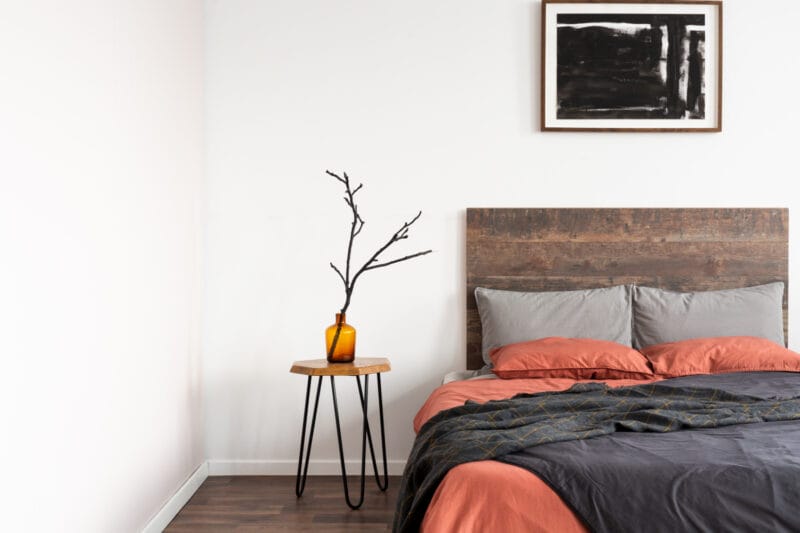
As children leave the house, many parents find themselves with extra space — and extra stuff.
Transitioning to an empty nest can be challenging and emotional for many parents, but it’s also a great opportunity to refresh your home and lifestyle.
Here are 10 practical tips to declutter your home and rework your spaces to align with this new season in your life!
1. Set Clear Goals
Before diving into the decluttering and rearranging process, stop to consider YOUR end goals.
Aside from clearing out the things you no longer need, how do you want your home to function for YOU in this new season?
- Do you want more space for entertaining and hosting guests (a large family room and extra sleeping spaces)?
- Do you want more space for a budding hobby?
- Do you want to create a magical fun zone for grandchildren?
- Do you want to reduce your possessions and downsize to a much smaller home?
- Do you want minimal upkeep so you are free to travel more?
- Do you want to be “the hangout spot” for your adult children and grandchildren?
Defining your goals for your home will help keep you focused and motivated throughout the decluttering process and give you the best chance to create the environment you want to come home to each day.

2. Start Small
Way back when I worked as a professional organizer in clients’ homes, my first piece of advice was always to “start small”.
After all, they didn’t acquire all their stuff in a day, and they won’t get rid of it in a day either. 😉
Don’t go into this process with the assumption you will tackle your entire home in one day or even one week. It will take time.
Make a list of 5-7 smaller spaces you’d like to tackle sooner rather than later, and then choose ONE to start with today — I love starting in a bathroom because it’s a small space that usually isn’t filled with sentimental items, so you can move quickly.
Work through each small space using the steps below. Challenge yourself to tackle 2 or 3 small spaces per week (as your schedule allows). The idea is that each of these small-space “wins” will inspire you to keep going!
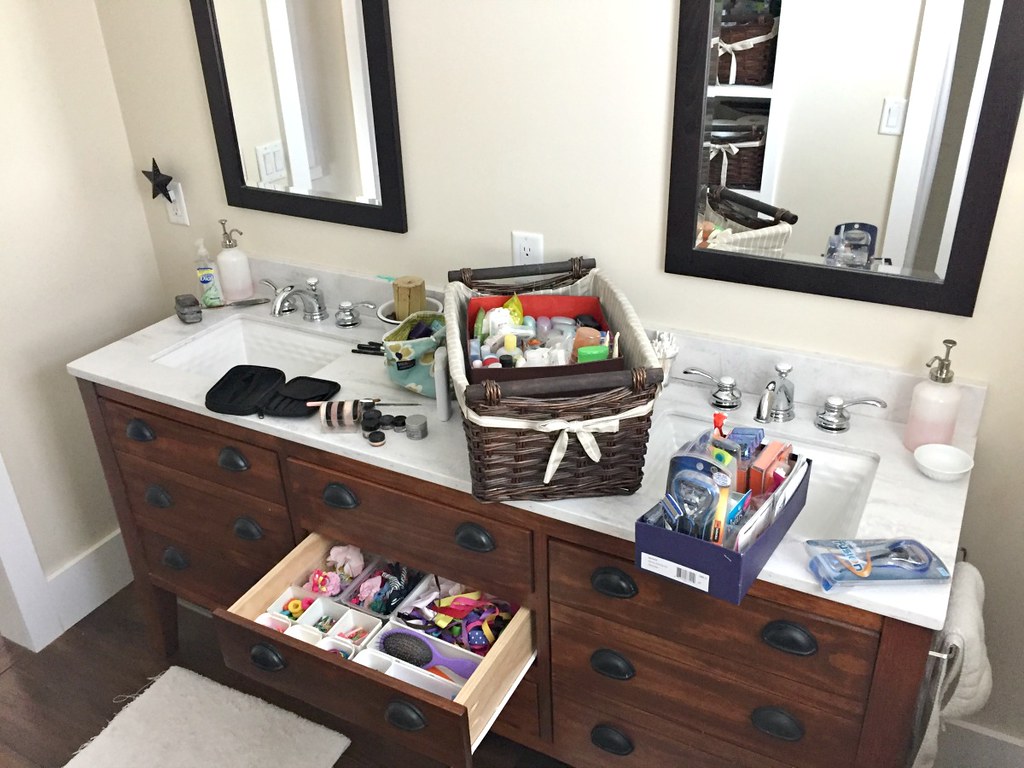
3. Ask Your Adult Children
If you’re decluttering their old bedroom or closet, it’s wise to let your adult children know the plan.
If they’d like something from their old space, give them a timeframe to pick it up (or offer to ship it to them if they are far away).
Don’t force them to take their old thing (they might not want anything), and don’t willingly offer to be their storage unit for an undefined amount of time either.
Remember, it’s ultimately your home, and you should be able to make the “final call” on the items inside your home, but it will certainly go a long way with your children if you include them in the process and give them a chance to claim anything they’d like.
4. Sort and Categorize
If you’ve watched any design or decluttering show, you know they almost always sort items into 4 main categories (keep, donate, sell, trash):
I love this system… but I break it down just a bit more:
- Keep in the same space
- Move to somewhere else in the house (I use a laundry basket for these items)
- Donate or give/return to someone (I use larger boxes for these items)
- Sell — only if you’re actually going to list it ASAP (I have a closet in my home I use for these items)
- Trash (I use trash bags)
As you go through each of your small spaces, make quick decisions and put the various items in each of the 5 categories above.
If you need to pause to consider an item, just put it in the “keep” pile for now and deal with it later. The idea is to move quickly here so you don’t get bogged down with decision fatigue and quit before your small space is decluttered.
Do NOT worry about organizing things or making the space look pretty and cute yet!

5. Fully Finish Each Space
After you get through each of your small spaces, putting the items into the 5 categories I listed above, give yourself an extra 30-40 minutes to fully finish the job (let me explain)!
- Throw out the trash immediately.
- Put donations and “return items” in your car trunk and make a plan to drop them off ASAP.
- Take 15 minutes to post the items you want to sell on Marketplace, eBay, or a Buy Nothing page.
- Put away any items you found from other spaces in your home.
- Finally, put anything remaining in your space back where it belongs (clothing in the closet, towels in the drawer, etc.)
It’s extremely easy to stop after you declutter without fully finishing the job — especially if you’re “just” working in an extra bedroom or a now-unused bathroom. But that leaves you with bags of trash, piles of donations, and more visual clutter and mental “to-dos” weighing you down.
Even if you’re working in spaces you don’t use on a daily basis, do your best to start AND fully finish before moving onto the next space.

6. Reevaluate Your Furniture Needs
As an empty nester, you likely won’t need nearly as much furniture as when all the kids were home.
A simple bed, nightstand, and chair might be sufficient for your extra bedrooms. And you likely won’t need nearly as much storage for games, books, shoes, sports gear, etc.
At the same time, you might want a larger table that can grow as your extended family grows. Or extra seating in the living room for when the whole gang is over to watch the game.
Consider the areas you could downsize, the furniture needs you might have, and possible ways to rearrange what you already have to serve your new needs (it’s honestly amazing what a little furniture rearranging can do for your home!)
RELATED READING: How we rearranged our entire main floor in 2020.
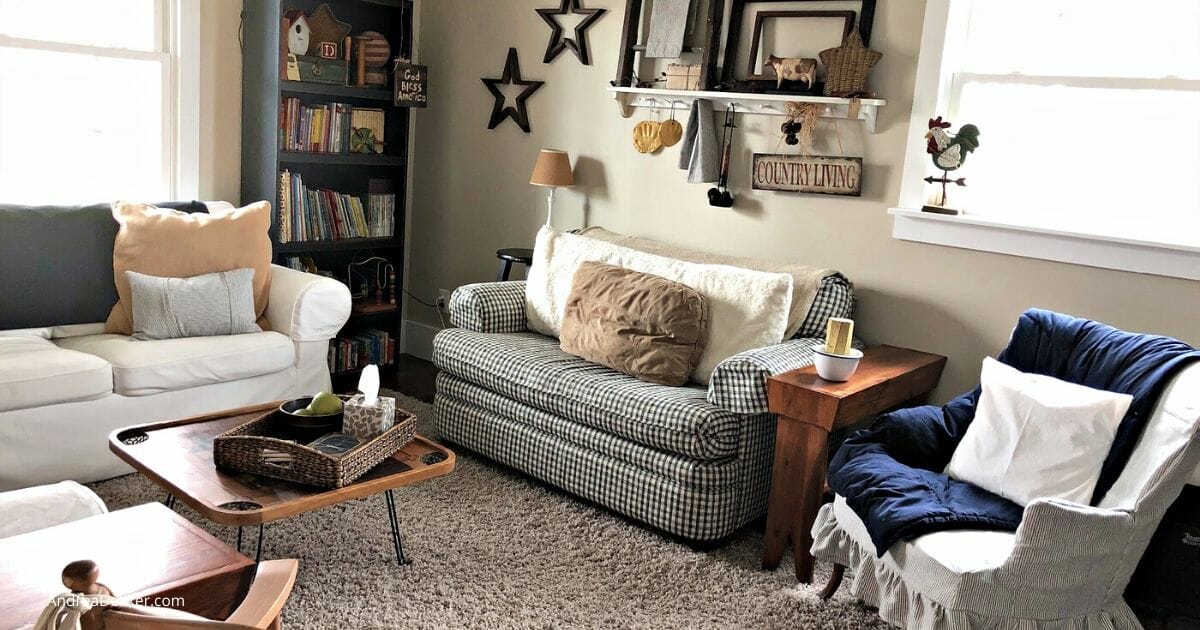
7. Have a Plan for Sentimental Items
I agree that some items just need to be held, felt, and smelled… but many other keepsakes can be digitized by simply taking a photo of them (especially if you’re diligent with printing or making photo books.)
Sentimental items like kids’ artwork, poems they wrote, special documents, or specific outfits you want to remember are easy things to snap pictures of and then toss the actual item.
If a picture won’t work, consider different ways of displaying sentimental items or even using them around your home (here are a bunch of practical examples of how I do this in our home.)

8. Create a Memory Box
If you have sentimental items you want to save, but your kids don’t want them, you don’t want to display them, and you don’t want to photograph them, I encourage you to create a “Memory Box”.
Aim for a box that’s manageable in size and use it to store whatever sentimental items you desire and that can fit inside the box. This limits what you keep while still honoring your children’s childhood.
If you have enough space, create one box per person — just don’t let stuff start piling up on top of the boxes or multiplying into 3 or 4 boxes per person. 😉
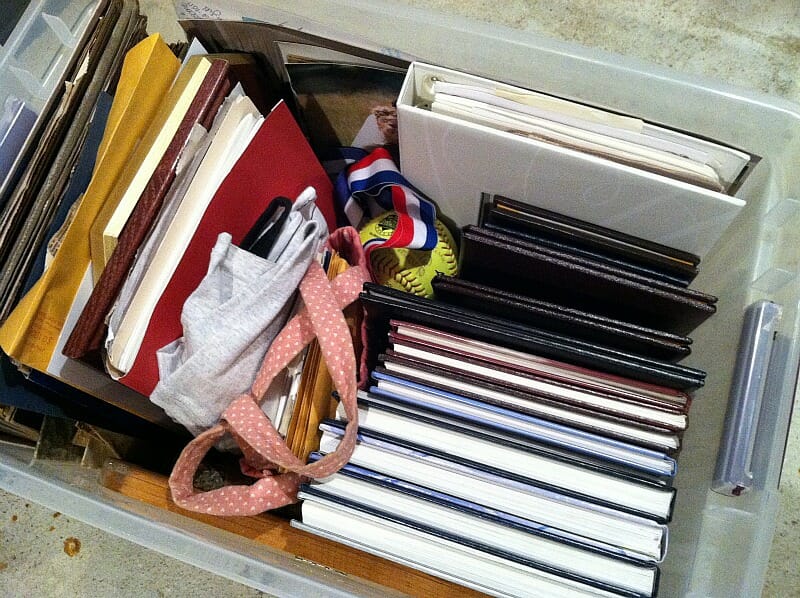
9. Embrace Your Empty Space
Once you start emptying out closets, cabinets, and even full rooms, you will instinctively want to fill them again (you think you won’t, but you will!)
This is one reason why I encourage empty nesters to reduce the amount of furniture they have (specifically storage furniture like dressers and bookshelves) — see #6 above.
It’s OK to have a few drawers, a closet, or even an entire room that’s completely empty. In fact, you should have empty spaces in your home, considering you no longer have nearly as many people living in your home.
Resist the urge to accumulate more, just because you “have the space to store it” and instead, let yourself get comfortable with the empty space while you envision what it could be used for in the future.

10. Implement a One-In, One-Out Rule
To prevent future clutter from piling up in those empty spaces, adopt a “one-in, one-out” policy.
I honestly encourage everyone to utilize this simple rule (we almost always do at our house), no matter what stage of life you’re in. However, it’s especially important for Empty Nesters who usually have significantly more space.
If you purchase new shoes, a new jacket, or a new purse, get rid of an old pair of shoes, jacket, or purse — even if you have the space to store them all.
This habit keeps your space from becoming overcrowded again and will save you hours decluttering in the future (an ounce of prevention is worth a pound of cure).
Transitioning to an empty nest can be both exciting and emotional.
It will take time… and perfection is never the goal.
But by investing the time and effort to declutter and think through the goals for your home, you’ll eventually create an organized-enough home that reflects your new lifestyle, that works for YOU in this new season, that brings you joy, and that you look forward to spending time in.
I’d say that sounds like a pretty good deal!
Do you have any other tips or suggestions for empty nesters? Leave it in the comments below!
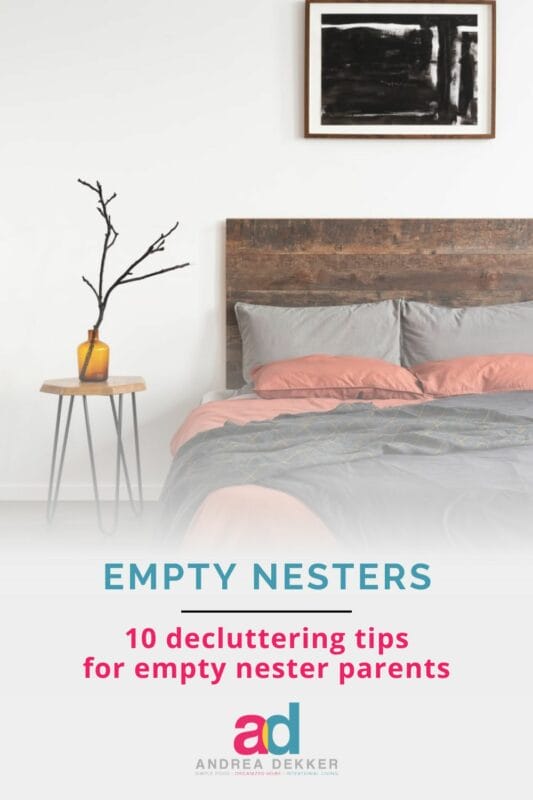

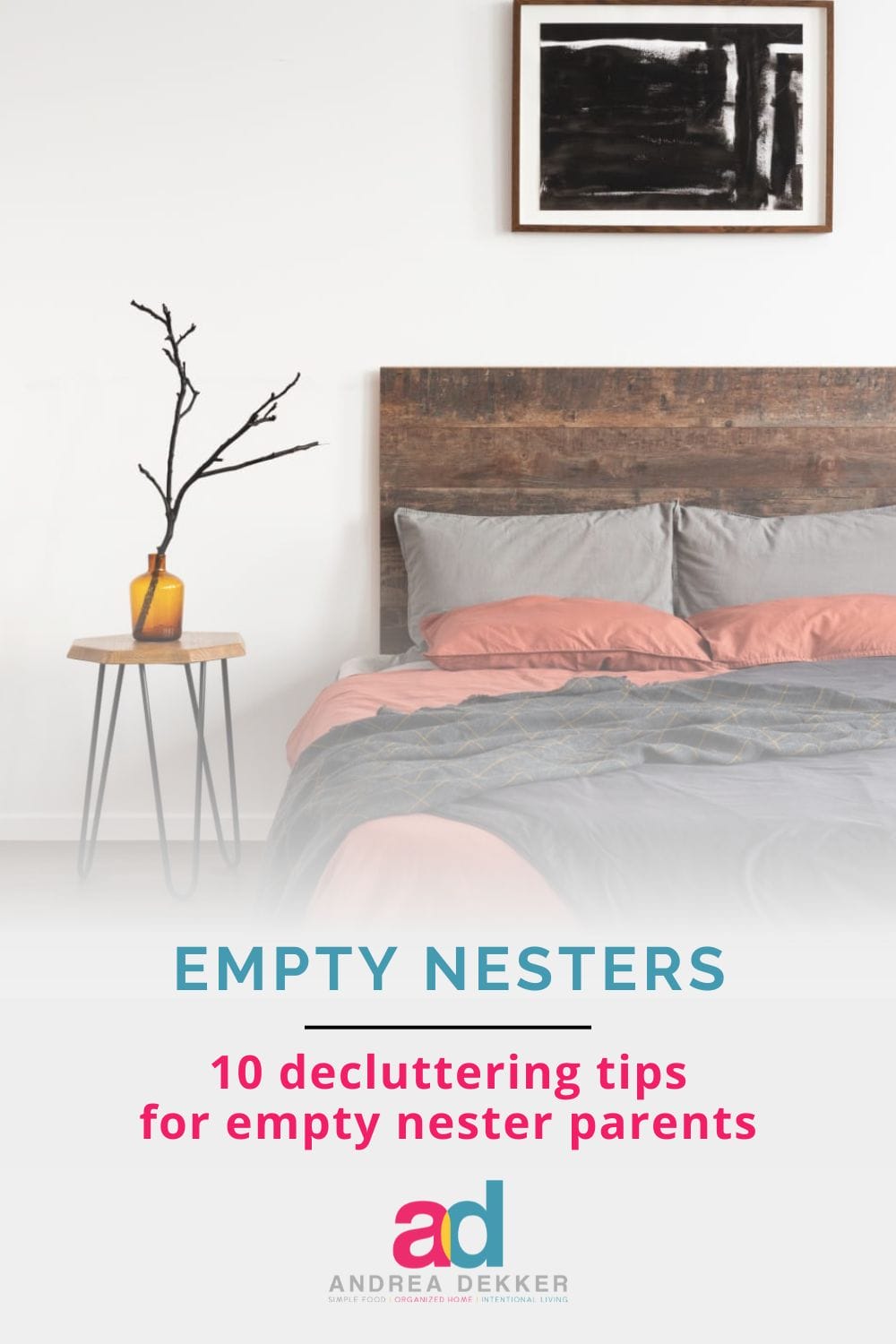
Kim says
Congrats on 20 years together!!! You chose well and have created a beautiful family, investing well in each child’s life.
Andrea says
Thanks kim!
Nancy says
I find taking pictures of things is best. My daughter’s dolls were completely used up and played with so hard. Her letter jacket had gotten weird and sticky. So I propped them up and took nice pictures and threw them away.
Also, we’re retired and bought a big 3 story house. My sister-in-law told me there is no need to furnish every room and she’s right. I just have to convince my husband of that.
Andrea says
yes, I love taking pictures of things and getting rid of the things (especially kids artwork!)
And yes, go with your SIL advice and leave some rooms empty! 🙂
Kelekona says
Give my mother a medal. Though for a while, I kept moving in and out, no permanence in where I was staying. I wouldn’t expect my room to remain untouched, though it was usually just stray boxes or projects. When I expected to be gone for several years, I did pack what I could away.
Then I would comb and purge and take things slowly. It really helped with my clutter to move into a fresh space and decide slowly what stayed or went.
Now that we own a house and I can destroy the walls to put up shelving, I apologize to my mother for still having junk there. There’s less there that’s mine than I think, apparently. We make video appointments over some boxes, I ask for other stuff to be found so for easy retrieval, ask if something else still exists or if I should buy a new one.
Angie says
Wrap it as a gift and they’ll think it’s something new, and instruct them not to open until you leave…and then run for the hills!!!! Lol
Glenne says
My daughters moved out for university (college) years ago but as they were living in on campus residences or share houses their storage options were limited. Also they’ were very young at that point and I suppose maintaining a room here for them helped me cope with their leaving! However they’re in their early 20’s now & getting more & more settled. One has moved a long way away for work & has taken lots of her stuff; the other two are closer but less settled & taking too much stuff just means helping them shift it to the next house when their leases expire. So!, our best solution has been to devote one room to being the “storage” room and in there is their stuff, furniture, & things from their childhood that they want to keep. We keep that door shut mostof the time; it’s meant the other rooms can be repurposed into spare rooms etc. Their wardrobes still have some clothing etc in them but that means they can pop home for a weekend without packing much 🙂 I can’t imagine the day coming when all of their stuff is gone!
Gina, book dragon says
I guess I’m one of the lucky ones. The only thing my daughter left after moving out (back home after a divorce) was her wedding dress!
Her brother moved into her room when she moved out and we recently cleared out his room for a guest room/library. She found stuff we had forgotten about and took it with her
Martina says
that is actually to funny, growing up in Germany my Mom and Grandma held strict to the custom of buying stuff during my childhood that i was suppose to take after i am married, like dishes, pots and pans, etc.
Its a great plan, except the fact that i got married, and moved 8000 miles away lol. My mom still has all that stuff in her basement, and still has hopes that one day i will come get it
Pixie508 says
When I moved into my first apartment, I actually took a bulk of the furniture from my bedroom at my parents house as well as the furniture from my college apartment with me. This necessitated cleaning out a lot of artwork from grade school, broken stuff, and just junk in general. However, there was still stuff when I left.
When we bought our first home 4 years ago, my mom told me that if I wanted that stuff, it would have to live at my house from now on (since I had the space). They wanted to turn my bedroom into an office, and my stuff was in their way. I went back (they only live a few miles away), and really pitched a lot more! I took a few rubbermaid containers and put in them things like my trophies and other awards, and other things of sentimental value. They’re labeled and on a high shelf in my basement. I know we really enjoyed going through my parents stuff like that when we were younger, so it was stuff I wanted to keep. The only things that are left at my parents house are a box or 2 in my closet, few homecoming/prom dresses, which my mom intends to donate to a program that provides dresses to under privileged teenage girls (perfect!) and my HS letter jacket, which I really just need to grab and stick in my coat closet here, but always forget. She doesn’t bug me about it, because it’s really not obstructive to them, and she forgets to bring it over too.
Cassie says
I am dealing with this problem right now, but not my kids stuff, my sister’s stuff. My hubby and I are moving into my parents house. The whole upstairs is just full of stuff, one of my sister’s things in particular. Asking nicely didn’t work and neither did not being so nice. I boxed up all of the stuff and every time I go to visit I leave a box (or 4 at their houses). It is slow going, but I needs to be dealt with and I don’t want to be the one that throws their things away.
Andrea says
Wow Cassie — you’re brave 🙂
You’re right, you can really throw out their stuff, but you CAN bring it to their house and let them deal with it!
Ottawa Storage Expert says
Great tips on decluttering all those kids stuff! All those toys, books, games, activities, etc just continue to add up each year. Getting them used to letting go of things they don’t need on a regular basis (maybe once a year before their birthdays) would minimize the clutter. Even if you’re not moving out, spring cleaning is still a must for every home right?
Danielle says
I don’t have room for a lot of stuff that I have at my parent’s house. I think most of it they can get rid of but I do want to go through things. It’s hard for me to get there. Every now and then when they have time, they send me a list of books and I tell them what to keep/get rid of. I was there for 1 day a few months ago as a stop along the way to somewhere else and looked through a few things. I’m really hoping that when I’m there at Christmas I can look through a lot of the stuff.
Becky says
Lol!! Great ideas!!! Hubs and I are the couple that both has stuff at our parents. His parents have a bunch of our Christmas stuff because the storage in ou apartment is severely limited and he isn’t the type to want to go through his stuff an figure out if he wants it or not. I have to push him. As it is, I can’t get him to go through our small storage closet in our apartment to clean I out!!
My mom (and this some of my stuff) is in FL still from
Our extremely fast move to MI. I ever got a chance to go down and pack up my books that are in a closet in my old bedroom, and a few other small items that I still want to keep (stuffed animals that are very dear to me and I plan to keep for any future kids we may have etc. but my room has turned into her home office and partial storage room since her shed broke down and she can’t afford to replace it at the moment. But we do have a very small apartment. If we move somewhere bigger we plan on taking it with us 🙂
KiwiKat says
When I first left home, Mum (she was the tough one!), said I was allowed to keep ONE box of stuff at home. There was actually a bit more that I kept (I think 3 boxes), but it meant I went through everything and if it didn’t fit in one of the boxes, it went to goodwill or friends or other family members.
I moved back home again after some time overseas and accumulated “stuff” again (I am, for better or worse, the living example of the saying “home is where you put your stuff while you’re out getting more stuff” – I at least work on it!) before moving out to my first home in this country. Each time mum came and visited, another box of “stuff” came with her.
She has also enjoyed helping furnish my place, as she loves going to auctions. We swap furniture in and out fairly regularly as we find better pieces to replace ones we have – we just send older pieces back to auction.
At least I didn’t have to stress too much about things I cared about being biffed, as the major items were clearly marked and set aside when I moved out.
Kathy says
As a couple who are temporarily living in an apartment, we have used some of your suggesstions. We have also moved several boxes for our son in the Air Force-he is out of country. Patience and persistence have worked Good Will has benefitted too. Good luck to all.
Erica says
Andrea, What are the most helpful books to help with organizing your home? I would love to hire a professional organizer but that is WAY out of our budget (see, our finances are organized! Now just need to organize our material possessions!). Thanks, love your blog!!
Patty@homemakersdaily.com says
My kids did the same thing when they moved out – they left a bunch of their junk behind! I think some of it was stuff they didn’t know if they wanted or not and some was keepsake type stuff that wasn’t important at that moment. But they left other stuff, too – stuff I thought they would want!
My husband does not like clutter so his strategy was this: every time we went over to see either of the kids, we took some of the their stuff with us. Pretty soon their stuff was all gone.
If they had lived somewhere where they didn’t have enough room, we would have kept it for them. But that wasn’t the case. They just didn’t want to bother with packing it and moving it. So we did it for them – a little at a time!
Jessica says
I think the very first step is to pack it all up into boxes and get it out of the way, even if it’s just to a better place in your own home!
For example: A girl that I work with has been married for over three years and away from home for about five years and yet her parents have left her room EXACTLY as it was in high school. She still has a full wardrobe in her closet/dresser, pictures on the wall, trophies on her shelves, etc. I’m sorry, but that’s a whole room they can’t use for anything! She lives ~700 miles away and doesn’t visit THAT often!
If I were her parents, the first thing I would do is pack everything up and put it in a closet, crawl space, basement, shed, attic, etc. At least then it’s not all spread out over my house. And then I could nag her about getting rid of it or whatever once it’s at least somewhat out of my way.
Christine says
My parents threatened to move a few years ago. I narrowed my “stuff” down to 4 boxes and shipped it to myself. My parents still haven’t moved!
My own kids are now teenagers and I am having trouble getting rid of all the toys. Any ideas what to do with thousands of legos that are all mixed up from a variety of themes? Our neighborhood doesn’t do garage sales.
Kelekona says
Is there a battered women’s shelter nearby? Some other charity that deals with children?
Oh, give them to a school in a less-off area.
Maybe there is a church whose tea-circle would volunteer to clean, sort, divide, and distribute those old toys.
Nora@ The Dollar Holllering Homemaker says
I totally agree with asking your kids if they actually want the stuff.
My husband moved about 1000 miles away from his family, his company paid for the move. He took everything he wanted and tried to throw the things he didn’t want, away. His mom “rescued” it from the trash and has sent some of the junk to us. We have gotten dirty old tee shirts, mugs with radio station/bank info on them, etc. I looked at the shipping costs $12 to send a bunch of stained tee shirts (that we turned into rags because we couldn’t donate them). I think we both would have preferred a dunkin donuts gift card or something:)
Linda Bolt says
Oooh, this is so timely for us! We have 3 kids in college, and one that has his first job and moved across the country.
My method so far has been to ask the kids to go through more of their stuff every time they are home on college breaks. So each break, there is less and less stuff. I don’t mind keeping some of their stuff while they are still in college and not really settled. We have come to realize that it’s not economical to save furniture for them; they can just get stuff on Craigslist in their new location.
We pretty much met the goal of having all of his stuff out of the house by the time our oldest moved across the country this summer to his first real job. I did find one Rubbermaid tub later that we missed, and we’ll be getting the important stuff from there to him whenever someone travels out there.
But here’s my dilemma still:
What about the stuff from childhood that no one owns or is owned in common? I’m thinking of toys, especially. We are loathe to part with all the nice toys we got our children: Playmobil, Legos, K’Nex, nice wooden blocks, set of Carnegie dinosaurs, and all the old-style Fisher-Price stuff. We intend for this to be for grandchildren when they come along, either divided up at their own homes, or at “Oma and Opa’s house”.
But if we wanted to downsize, I’m not sure what we would do with all that stuff.
Oh, I do have an idea for trophies: Take them to a trophy place, and see if they have a way to reuse them. I know some trophies can just have the nameplate switched out, and it would be a less-expensive way for a group to give out trophies.
And, yes, we have a major collection of trophies here from 4 children, and I’m not sure I could part with them. They represent hours of hard work, on my part as well as the children’s.
Katherine says
Re: the old-style toys– As a mom of three little ones, the toys that I grew up with are so so fun to see all over again. One of my friends’ mom saved her old toys and now her daughter plays with them and it is pretty cool. If it were me, I would allocate one particular box for the toys and save whatever you can fit in there. If it is five particular toys, those will be particularly special. Definitely don’t feel like you need to save boxes and boxes of toys– then they aren’t as special, anyway, because there’s so many of them. My dad and his wife have one large basket of toys for all nine grandkids to play with when we all visit, and they have a ton of fun with those. My in-laws have lots of toys in every room of their house and the kids have the same amount of fun. Their fun is not increased by the volume of toys;)
My two cents! Hope that is helpful.
Jane says
LOL, I was attending college out of state & had moved off campus into a shared apartment. One day out of the blue my Mom called to say that she & one of my brothers would be coming to town for the weekend as my brother was going to be participating in a surfing competion being held nearby.
Anyways, they showed up alright but had literally brought everything I had every owned or could be most closely associated with me. LOL Mom had managed to get all my clutter out using my brother as hired muscle & a rented U-Haul.
It was a brilliant plan on her part & when it came time for the very same brother to move out…he knew to go ahead & take everything with him right then & there so Mom wouldn’t show up on his new doorstep with no warning!
Amanda @ The Fun Mommy says
LOL that’s hysterical! It did teach you guys your lesson though.
Reminds me of when my dad owned a bunch of apartments. People would move out and leave tons of stuff behind that they didn’t want-and that he would have to pay to dispose of. Instead he would load it onto a trailer and deposit it in front of their new place.